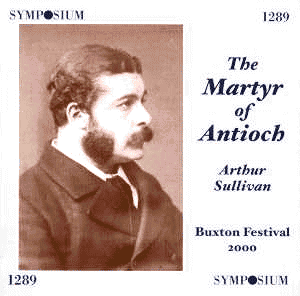Sullivan was the laureate composer of Queen Victoria’s
reign and, at least in the mid Victorian era, Britian’s greatest composer.
One observer compared his genius favourably with that of Brahms. For
much of the 20th Century his reputation, sullied by academics,
was in decline, apart from the continuing popularity of the Savoy operas,
which, because they were light music, academic critics averred, did
not "count" in assessing his musical reputation.
Only during the past couple of decades has an attempt
been made to re-establish his non-Savoy compositions and in this the
Sir Arthur Sullivan Society has played the leading role. As a result
of these efforts it has become clear that Sullivan’s gift for memorable
melody, his brilliant orchestration and his sure dramatic sense extend
throughout his output.
His "sacred musical drama" (his own expression)
The Martyr of Antioch was composed in 1880 for the Leeds Triennial
Festival of which Sullivan was Musical Director. The plot is simple
enough. The Martyr, Margharita, has been converted to Christianity in
3rd Century Antioch. She is beloved by Olybius, the Roman
prefect and therefore a pagan; he and Margharita’s father Callias, Priest
of Apollo, beg her to re-convert, but to no avail, and she is put to
death.
A recent observer, John Caldwell, has expressed the
view that The Martyr was the most interesting oratorio in dramatic
form before Elgar’s Gerontius. Whether or not we subscribe to
that view, it is good to have here its first CD recording. This is from
a live performance from the 2000 Buxton Gilbert & Sullivan Festival,
sponsored by the Festival and the S.A.S.S. There is some fine solo singing
from Catherine Foster (soprano: Margharita) and Stephen Brown, an ardently
lyrical tenor (Olybius). In smaller roles I would mention Gilliam Knight,
highly respected in Savoy and other roles and a Dame Carrithers soundalike
as a Priestess of Apollo, Gareth Jones (Callias) and Stephen Godward.
Sullivan gives them several fine solos and duets, most memorable being
Margharita’s final moving declaration of Christian faith, prefigured
in the orchestral Introduction. This, for me, recalls the In Memoriam
overture.
Much of The Martyr’s 79 or so minutes could
have come out of the Savoy operas. It is placed chronologically between
Pirates and Patience. However this should perhaps be put
the other way round as Sullivan’s "serious" and "operetta"
styles are scarcely different considered in purely musical terms. Probably
the academics' tunnel vision, alluded to above, may be put down to jealousy
that Sullivan made more money – even if he lost it – than they did.
Particularly is this true of the choruses, pagan and Christian. For
all the solemnities of the once-popular "Brother Thou Art Gone
Before Us", the music for the pagans, is more direct and attractive.
A parallel in this can be found in Handel’s favourite oratorio Theodora,
whose plot has many similarities with The Martyr.
Richard Balcombe secures a committed and accomplished
performance from his forces and while occasionally one has to bear in
mind this is a "live" recording, the release is highly recommendable
in shedding light on a long-dark corner of English oratorio. There appears
to have been no performances of it between 1914 and 1983. The booklet
unfortunately does not print the words and something appears to have
gone amiss with its reprinting of Sullivan’s preface to the published
edition. These shortcomings do not seriously affect my warm recommendation.
Philip Scowcroft
See
also review by Arthur Baker


